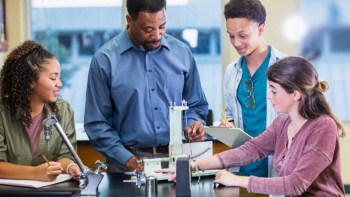Matin Durrani explains why today’s PhD students face unprecedented challenges but lack enough support

If you’ve ever done a PhD in physics, you’ll know it can be a tough experience. You’re learning the art of research and trying to get real scientific results for the first time in your career. There are theories to understand, experimental techniques to master and software codes to learn. You might even be in a different country, coping with a new language or culture. And then there can be workplace problems to contend with: difficult colleagues, unpleasant discrimination and unseen hierarchies.
But life has been especially hard for today’s PhD students, whose work has been hit by the COVID-19 pandemic. They’ve had to cope with labs being shut, experiments stopping and contact with supervisors and colleagues being disrupted. As Physics World contributing columnist Karel Green describes in a feature article, many students have, not surprisingly, fallen behind with their work and struggled to get enough results. Sure, PhDs students have always faced such problems, but they’ve been exacerbated by the restrictions imposed during the pandemic.
Green, who is doing a PhD in astrophysics, has based her article not just on her own experiences but also those of others in a similar position to her own. As she discovered, some students have simply been left to sink or swim. Despite the COVID disruption, they’ve not necessarily been given extra money or enough extra time to write up their PhDs. And even if they have received additional support, they’ve often had to fight for the funding or track it down under their own steam. Students feel their problems are either being ignored or swept under the carpet.

Stress, overwork and no support: what happens when your PhD funding runs out
Green’s article underlines wider concerns over the very nature of PhDs, which were once seen as a door into a permanent academic research career for a select band of top students. These days, however, universities too often see PhD students as a form of cheap labour, with not enough consideration given to the reality that many will go on to work outside academia. What’s worse, PhD projects aren’t always well thought out or supervised, with some students collecting data without proper direction, structure or hypothesis.
For those students who successfully jump all these hurdles and submit a thesis, there are further concerns over the nature of the PhD viva, as Physics World contributing columnist Pruthvi Mehta explains. In the UK, there is no standard length for this oral exam, while the subject knowledge of the examiner can vary wildly from one student to the next, putting some at a disadvantage through no fault of their own.
Trouble is, those who end up in academic posts have no reason to question what went wrong for those who struggled. If you’ve got your PhD, why worry about anyone who hasn’t? But those whom the system has failed are in danger of being left with a sour a taste in their mouths, potentially quitting physics altogether. And that cannot be good for anyone concerned about the future of the subject.



